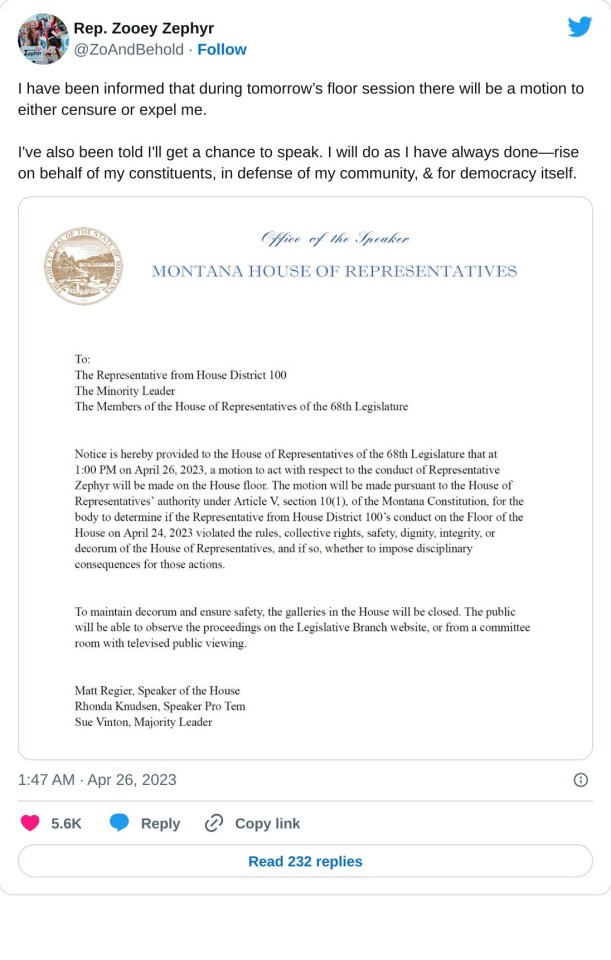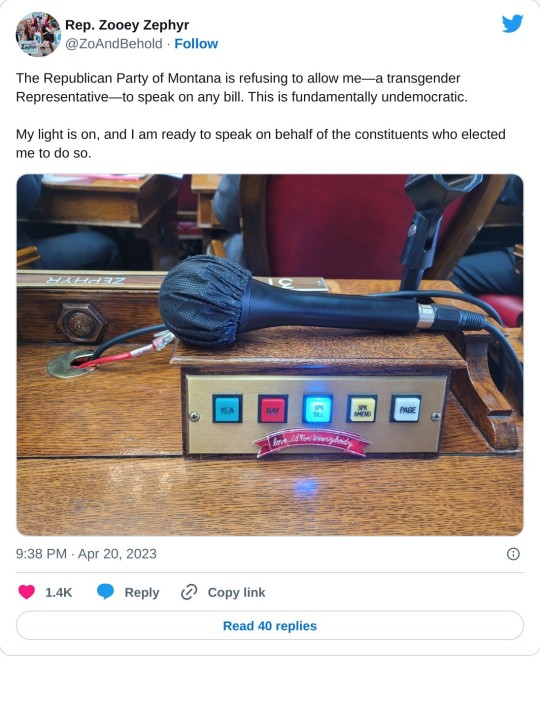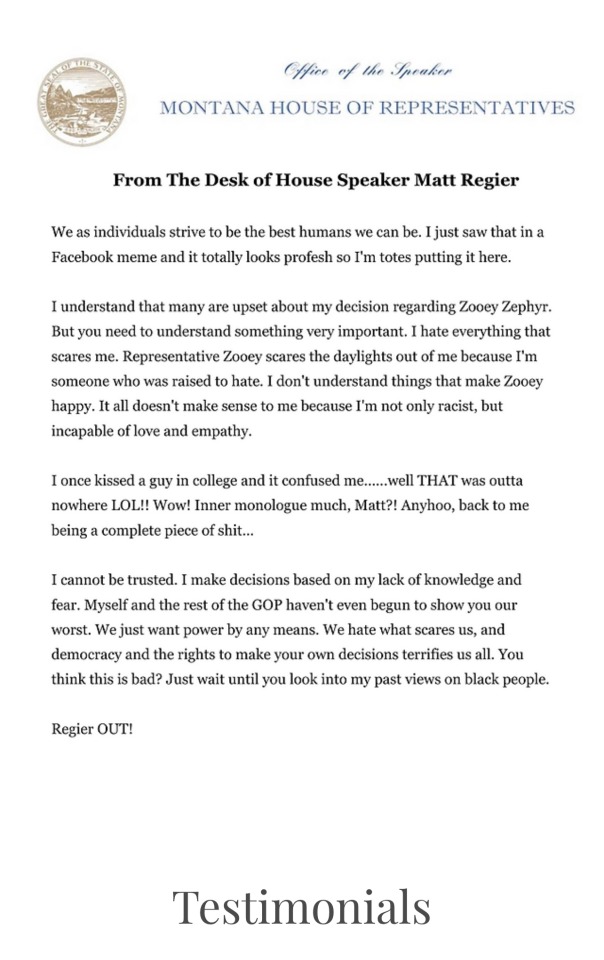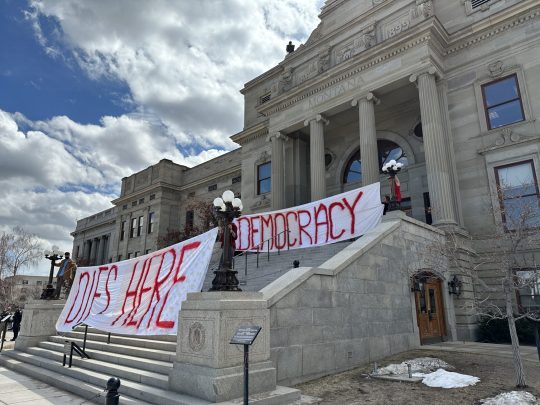#Matt Regier
Text
The first openly transgender state representative in Montana history is facing either censure or outright expulsion, after she said Republicans would have “blood on their hands” for passing a ban on gender-affirming care for minors.
Rep. Zooey Zephyr was sworn in just three months ago after winning a Missoula-based seat in November. GOP leaders have refused to recognize her in floor debates until she apologizes for the comment. On Monday, supporters rallied on the steps of the state Capitol, and chants of “Let her speak!” shut down proceedings in the House for nearly a half-hour, as Zephyr hoisted her microphone above her head.
On Tuesday, Zephyr tweeted a letter she received from leaders in the Republican-controlled chamber declaring their intention to bring a motion “with respect to the conduct of Representative Zooey Zephyr.”
The House will “determine if [Zephyr]’s conduct on the Floor of the House on April 24, 2023 violated the rules, collective rights, safety, dignity, integrity, or decorum of the House of Representatives, and if so, whether to impose disciplinary consequences for those actions,” according to the letter sent to Zephyr. The House will meet Wednesday afternoon.
“I have been informed that during tomorrow’s floor session there will be a motion to either censure or expel me,” Zephyr said in a Tuesday tweet. “I’ve also been told I’ll get a chance to speak. I will do as I have always done—rise on behalf of my constituents, in defense of my community, & for democracy itself.”

Zephyr’s clash with the GOP began last week when she made the comment during a floor debate on the transition care ban. Since then, Republicans have refused to let her participate in floor debates entirely, even when she’s requested to speak last week, the far-right Montana Freedom Caucus demanded Zephyr’s immediate censure while misgendering her in their statement.

The move to silence Zephyr has been met with fierce protests. On Monday, supporters rallied on the steps of the state Capitol, and chants of “Let her speak!” shut down proceedings in the House for nearly a half-hour, as Zephyr hoisted her microphone above her head.
Riot cops who were called to the chamber arrested seven protesters. Republicans claimed that the protests had turned violent, though the protesters were charged only with criminal trespassing, a misdemeanor. In the letter, Republican leaders said the House gallery, where Montana citizens are able to watch proceedings, will be closed Wednesday during the debate on whether to punish Zephyr.
“It’s not enough for them to get the harmful bills through,” Zephyr told reporters Monday. “When someone stands up and calls out their bills for the harm they cause, for the deaths they cause, they want silence. And we will not be complicit in our eradication.”

Montana House Speaker Matt Regier said in a statement Tuesday that “the choice not to follow House rules is one that Rep. Zephyr has made.”
“The only person silencing Rep. Zephyr is Rep. Zephyr. The Montana House will not be bullied,” Regier said.
Tensions have escalated in state legislatures such as Montana’s this year, as Republicans across the country have used simple rules violations as a pretext to crack down on dissent.
Earlier this month, the Tennessee House of Representatives expelled two young Black lawmakers, Rep. Justin Pearson of Memphis and Rep. Justin Jones of Nashville, and nearly expelled a third white lawmaker from Knoxville, after the trio protested for gun law reforms in the wake of the Covenant School shooting in Nashville in March.
The move, however, backfired spectacularly. Pearson and Jones became national figures overnight, they were quickly re-appointed to the seats they’d been expelled from, and both are expected to run in special elections to determine a replacement for, well, themselves. They met with President Joe Biden at the White House earlier this week.
Tennessee Republicans have also drawn increased scrutiny to themselves, after expelling Jones and Pearson for bringing “disorder and dishonor” to the legislature; a member of the leadership abruptly resigned last week after a complaint that he’d sexually harassed an intern became public, and the Speaker of the Tennessee House, Cameron Sexton, has faced new questions about whether he really resides in his district.
On Tuesday, Pearson offered his support to Zephyr in a tweet.

“Voices across the country continue to rise for justice and expose the anti-democratic behavior of people in Republican led states,” Pearson said. “We will not let our democracy die without fighting for every voice. We are in this fight from Memphis to Montana!”
#us politics#news#vice news#montana#transgender#transgender pride#transgender rights#transgender representation#trans rights#Montana house of Representatives#gender affirming care bans#trans healthcare ban#trans healthcare#Montana Freedom Caucus#Matt Regier#Zooey Zephyr#gop#tweet#Maritsa Georgiou#conservatives#republicans#Montana Capitol#censure#2023#Justin Pearson#Justin Jones#tennessee three#Tennessee
349 notes
·
View notes
Text
What an asshole

HELENA, Mont. (AP) — Montana transgender lawmaker Zooey Zephyr spent her first day in legislative exile Thursday relegated to a bench in a noisy hallway across from a snack bar outside the state House chambers where she is no longer allowed.
Zephyr defiantly stayed put even after the Republican House speaker said she couldn’t be there and a House security officer threatened to move the bench where she had set up her laptop. She listened to debate and voted remotely from there, with a gold sticky note on the wall above her head that read “Seat 31,” her seat assignment in the house. The note was placed there by transgender and nonbinary Rep. SJ Howell.
Republicans had wanted Zephyr to participate from behind the doors of the House Minority’s offices a day after they voted to ban her from the House floor for the rest of the session, which ends early next week.
Her refusal to do so came as Democrats sought to keep Zephyr’s banishment in plain view after a week’s worth of nationwide public scrutiny over Republicans’ unprecedented actions to silence her, which continued Thursday.
Republicans moved to sideline Zephyr further by shutting down the two committees she serves on and moving the bills they were to hear to other committees, Democratic Rep. Donavon Hawk said in a statement.
(continue reading)
#politics#republicans#matt regier#zooey zephyr#lgbt#montana#lgbtq#homophobia#transphobia#republicans are evil#tiktok
224 notes
·
View notes
Text
Zooey Zephyr vs Montana
Zooey Zephyr Holds Strong
Zooey Zephyr, an elected lawmaker, is being shut out of Montana legislation because she is a transgender woman.
Zooey Zephyr was elected last year to the Montana House of Representatives to represent the 100th District of Montana, which covers the city of Missoula. She ran for office because as an activist for LGBT+ rights who has spoken before the legislature before, she felt her words were not…

View On WordPress
#lgbt in politics#matt regier#montana#sue vinton#transgender#transgender youth#transphobia#zooey zephyr
0 notes
Text
By Jessica Corbett
Common Dreams
May 1, 2023
The ACLU of Montana and legal partners on Monday filed a lawsuit on behalf of state Rep. Zooey Zephyr and her constituents, challenging Republicans' censure of the legislator, who called out her GOP colleagues for their new ban on lifesaving gender-affirming healthcare for youth.
"This is an action for emergency declaratory and injunctive relief against defendants arising out of their unconstitutional censure and retaliatory silencing of Rep. Zooey Zephyr, a member of the Montana House of Representatives who engaged in constitutionally protected speech," says the complaint, filed in state court against House Speaker Matt Regier (R-4) and Bradley Murfitt, the chamber's sergeant at arms.
"House leadership explicitly and directly targeted me and my district because I dared to give voice to the values and needs of transgender people like myself."
"As a result of the censure, Rep. Zephyr—elected to represent 11,000 constituents in House District 100—is physically barred from entering the Montana State Capitol and cannot engage in speech and debate on important matters of public concern," the complaint continues, arguing that the move deprives her "constituents of the right to full representation in their government."
Zephyr, Montana's only transgender legislator, said in a statement Monday that "this effort by House leadership to silence me and my constituents is a disturbing and terrifying affront to democracy itself."
"House leadership explicitly and directly targeted me and my district because I dared to give voice to the values and needs of transgender people like myself," she declared. "By doing so, they've denied me my own rights under the Constitution and, more importantly, the rights of my constituents to just representation in their own government. The Montana state House is the people's House, not Speaker Regier's, and I'm determined to defend the right of the people to have their voices heard."
While Republicans who voted to censure Zephyr last week claimed it was in response to a protest by her supporters in the House gallery that they accused her of encouraging, Regier refused to recognize Zephyr on the chamber's floor after she told legislators they would have "blood on their hands" if they backed Senate Bill 99, the ban on gender-affirming care for minors that GOP Gov. Greg Gianforte signed into law on Friday.
Echoing Zephyr's warning to state lawmakers last month, Anna Wong, a resident of Montana House District 100 and a named party in the suit, stressed that "suicide amongst transgender youth is not imaginary."
"It is not a game and it is not a political foil. It is real. It is heartbreaking. And it is the responsibility of my representative to speak out against bills promoting it," Wong continued. "I expected Rep. Zephyr to oppose, and her comments leading to expulsion from the House floor, which I have listened to, seem incredibly measured and muted compared to the severity of the situation."
Dean Chou, a fellow district resident and party to the suit, said that "I feel alienated and disenfranchised to have my representative expelled from debate."
"Rep. Zephyr is my representative on all issues—not just those that directly impact or target transgender Montanans," added Chou. "I believe Rep. Zephyr has done an effective job advocating for my interests and my rights on all issues, and I want Rep. Zephyr to continue to do so."
Since Zephyr was barred from entering the chamber last week, multiple study bills awaiting votes in committees on which she sits were sent to another panel or the House floor, and legislators are set to debate amendments to the state budget this week.
"Rep. Zephyr was elected by the people of her district after running on the very principles she is now being punished for defending," said ACLU of Montana legal director Alex Rate. "In his craven pursuit to deny transgender youth and their families the healthcare they need, Speaker Regier has unfairly, unjustly, and unconstitutionally silenced those voters by silencing their representative."
"His actions are a direct threat to the bedrock principles that uphold our entire democracy, and we welcome the privilege of defending the people of Montana's 100th House District from this desperate and autocratic effort to silence them," Rate added.
The ACLU of Montana, the national ACLU, and Lambda Legal have also promised to take legal action against S.B. 99, saying in a joint statement earlier this year that "Montana lawmakers seem hellbent on joining the growing roster of states determined to jeopardize the health and lives of transgender youth, in direct opposition to the overwhelming body of scientific and medical evidence supporting this care as appropriate and necessary."
Read more.
#zooey zephyr#representation denied#democracy denied#anti democracy#matt regier#montana state house#greg gianforte#republicans
1 note
·
View note
Link
Rep. Zooey Zephyr, the first transgender woman elected to Montana's legislature, attended a Montana House of Representatives session to oppose an anti-transgender bill that would remove references to transgender individuals from more than 40 sections of state code. The bill, which would define sex in a way that excludes trans people, was one of over a dozen heard this year. The previous day, her strong speech against the gender affirming care ban the state had passed led to the Montana Freedom Caucus calling for her censure while intentionally and repeatedly misgendering her. When she punched in, they refused to recognize her to speak, and instead moved forward to pass the bill.
Tensions flared on the House Floor when the entire Democratic Caucus rose to demand that she be permitted to speak. In a strikingly undemocratic move, Republican House Speaker Regier declined to allow it, asserting that he could refuse to allow anyone to speak at his discretion. When Minority Leader Abbott objected, they moved to a packed rules committee meeting, which upheld the ruling. Following that, the Speaker stated it was his intent to no longer allow Representative Zephyr to speak moving forward.
#US Politics#Erin Reed#our current besiegement by theocratic fascists#transphobia#government-sanctioned hate#in support of an informed and engaged electorate
11K notes
·
View notes
Text


Toby Morton bought MattRegier.com
Matt Regier is the Montana House Speaker and a hot pile of human garbage.
655 notes
·
View notes
Link
The Montana Jewish Project asked Speaker of the House Matt Regier this week if he could help the nonprofit understand the reason Rep. Ed Stafman, a rabbi, was denied the opportunity to lead prayer at the end of the legislative session.
In a phone call, Stafman said the decision by leadership to disallow him from offering his scheduled prayer is a minor indignity compared to other activity during the legislative session.
He said people who are LGBTQ+ and renters, for instance, received the short end of the stick. Stafman, who led a congregation in Bozeman and is a rabbi emeritus, also noted he was allowed to offer a prayer early on during the session, but then also taken off the schedule at least one other time.
Stafman had planned to offer a prayer based on passages from the book of Isaiah that discuss justice. He said the body had been praying together for nearly 90 days at that point, and it made him think of the intense prayer of Yom Kippur.
In those verses, he said God through the prophet offers people a reminder to not feel too self righteous: “I’m not interested in your words. I’m interested in you doing justice.” In other words, he said, God reminds people to take in those who are homeless and feed those who are poor.
Stafman said he learned he wasn’t going to have the opportunity to offer the prayer the Monday he had been scheduled to give it, and the legislator who coordinates the invocation didn’t explain the reason, but he said “obviously it had come from leadership.”
He noted the change in a public comment on the floor of the House, but he said his only interest was in marking the incident for the record, and he hasn’t pursued it further. He also said he and an elected minister are the only “professional prayer leaders” in the body.
Overwhelmingly, the prayers offered all session “had very, very Christian bents,” in the tradition of “high Christology,” he said. “The great majority of them are offered in Jesus’ name, for example.”
He said he prays in public all the time, and when he’s praying in a public space with people of different religious beliefs, he tries to make sure his prayer is ecumenical and “works for everybody,” even if it has Jewish roots.
“So it felt to me that the fact that it wasn’t Christian played a role,” Stafman said. “Can I prove that? Nobody said that to me, no.”
He hasn’t experienced antisemitism directly at the Capitol, but he said it manifests at least in the way legislation is treated, for example.
The legislature expanded a law that protects the rights of health care providers to opt out of practices that are against their religious views, but Stafman said his bill that would have protected the right of a pregnant woman to have an abortion from a willing provider was tabled.
Jeff Laszloffy of the Montana Family Foundation testified against the bill, and Stafman said he compared bill supporters with Satanists: “He didn’t specifically call us Satanists, but that was the analogy he drew.
“Two or three days later, there were fliers distributed in my neighborhood by a Nazi group that cited two Biblical verses from the Christian Bible that said Jews are Satanists, the children of Satan,” Stafman said.
He said he can’t draw a line from the testimony to the fliers, and he can’t point to antisemitic comments directed at him. But Stafman also said some committee members “clearly showed a lack of respect for my religious beliefs.”
212 notes
·
View notes
Text
"'I have lost friends to suicide this year,' [Zephyr] said. 'I field the calls from multiple families who dealt with suicide attempts, with trans youth who have fled the state, people who have been attacked on the side of the road, because of legislation like this. I spoke with clarity and precision about the harm these bills do. And they say they want an apology, but what they really want is silence as they take away the rights of trans and queer Montanans.'”
5 notes
·
View notes
Link
#im becoming tranny joker#not that i have faith in my government in the first place#but sigh#anyway posting because i dont wanna reblog vaspider. LOL
1 note
·
View note
Text
Profiles of Pride: June 15th! 🏳️🌈Zooey Zephyr🏳️🌈
Zooey Zephyr (born August 29, 1988) is an American politician and university administrator who represents Missoula in the 100th district in the Montana House of Representatives. A member of the Democratic Party, she was elected in the 2022 election, making her the first openly transgender person to be elected to the state legislature in Montana. She was sworn in as a representative on January 2, 2023.
Zephyr became involved in activism in 2020. She testified before the Montana legislature in defense of LGBT+ rights and met with Republican Governor Greg Gianforte, but felt her words were not heard. Having watched bills limiting the rights of transgender people pass with one-vote margins, such as legislation making it difficult for transgender people to update birth certificates, she felt she needed to "get into the room where the laws are being written". On March 1, 2021, Zephyr decided to run for state representative in the 2022 mid-term elections.
House District 100 (Missoula) has been described as "one of the bluest" (i.e., most Democratic) districts in Montana. The seat was previously held by Andrea Olsen, who left the seat to run for state senator. Zephyr defeated Dave Severson in the Democratic primary on June 7, 2022. Upon defeating Republican opponent Sean Patrick McCoy that November, Zephyr became the first trans woman to be elected to the Montana legislature alongside SJ Howell, the first non-binary person to be elected. Zephyr assumed office in January 2023. On April 28, 2023, Zephyr announced she would seek re-election in 2024.
Zephyr was a vocal opponent of the multiple anti-LGBT+ bills introduced during the 2023 legislative session. During a floor debate on April 18, 2023, Zephyr admonished those who supported Senate Bill 99, which prohibits gender-affirming medical and surgical care for transgender minors. She first commented, "If you are forcing a trans child to go through puberty when they are trans, that is tantamount to torture, and this body should be ashamed." When this remark triggered an objection from Republican majority leader Sue Vinton, Zephyr replied, "The only thing I will say is if you vote 'yes' on this bill and 'yes' on these amendments, I hope the next time there's an invocation when you bow your heads in prayer, you see the blood on your hands." This prompted backlash from House Republicans. The Montana Freedom Caucus issued a statement misgendering Zephyr and calling for her censure. Zephyr stood by her words, and House Minority Leader Kim Abbott defended her, describing the statement as "blatantly disrespectful and the farthest thing imaginable from the 'commitment to civil discourse' that these letter writers demand". Thereafter, Speaker Matt Regier refused to let Zephyr speak on any bills despite no censure having taken place.
On April 24, about 100 people gathered at a rally in support of Zephyr, prompting heavy police presence. That afternoon, Zephyr was again denied speaking privileges, prompting every present Democratic lawmaker to stand in protest. All but two Republican members of the chamber's supermajority voted to uphold Regier's ruling. Protesters in the House Gallery then began chanting, "let her speak," resulting in a half-hour delay in proceedings as riot police were brought in to clear the gallery. Most Democratic legislators remained in the House chambers, mostly in the wings, but Republican lawmakers evacuated the room. Zephyr remained at her desk on the floor, silently holding aloft a microphone. Seven people were arrested, and after booking were released without needing to post bail. Afterwards, members of the conservative Montana Freedom Caucus, in a written letter that also misgendered Zephyr, accused her of "standing in the middle of the floor encouraging an insurrection."
On April 26, a hearing was held to vote on a proposal to sanction Zephyr's actions during the protest on April 24. After a speech by Zephyr and a brief debate limited to three speakers on each side, the House voted 68–32 along party lines to bar Zephyr from the House floor, gallery, and antechamber until the adjournment of the 2023 session the first week of May. She was permitted to vote remotely for the remainder of the session.
On April 27, Zephyr set up her laptop and assorted paperwork on a bench outside the House Chambers in a hall open to the public. Behind the bench, she placed a sticky note saying "Desk 31"—her designated seat on the house floor. When Regier asked her to leave, House Democrats pointed out that she was in a public area. He responded that he was afraid she was blocking the hallway, but claiming to be reassured that she was not blocking traffic, agreed that she could remain. Additionally, following her expulsion, Republican leadership cancelled all remaining hearings of the committees on which she served. To handle the bills still pending, they used their supermajority to "blast" several bills directly to the floor, and reassigned other bills to different committees. On May 1, the bench from which she had been working was occupied by a group of women, including Regier's mother, and the wife of senator Steve Hinebauch, in order to prevent Zephyr from sitting. A photo of the women apparently laughing and leering drew comparisons to civil rights era photos of white student Hazel Massery shouting at African-American student Elizabeth Eckford during the Little Rock Crisis. On subsequent days, a group of Zephyr’s supporters, primarily a group of tech workers able to work remotely dubbed “The Blue Bench Brigade,” came in and occupied the bench to save Zephyr’s spot. Immediately upon adjournment sine die on May 2, Zephyr walked onto the House floor to meet her colleagues.
On May 5, it was noted that the American Civil Liberties Union (ACLU) intended to defend the protesters who were arrested at the Capitol on April 24.

#Zooey Zephyr#Pride#Pride Month#Trans Pride#Trans Rights#Trans Rights Are Human Rights#LGBTQIA+#June Pride#June 15th#Pride 2023
1 note
·
View note
Text





There’s trolling, and there’s professional trolling™

👉🏿 https://www.mattregier.com/
49 notes
·
View notes
Link
Montana’s House speaker on Thursday refused to allow a transgender lawmaker to speak about bills on the House floor until she apologizes for saying lawmakers would have “blood on their hands” if they supported a bill to ban gender-affirming medical care for transgender youth, the lawmaker said.
Rep. Zooey Zephyr, who was deliberately misgendered by a conservative group of lawmakers demanding her censure after Tuesday’s comments, said she will not apologize, creating a standoff between the first-term state lawmaker and Republican legislative leaders.
Conservative snowflakes...
0 notes
Text
The ‘War on the Floor’ is a mess made by the GOP, for the GOP. But Montana gets the black eye.
The Montana Republicans said the quiet part out loud.
Not just out loud, but in a press release, memorialized for all to see.
“House Leadership will still stand firm in our commitment to decorum, safety, and order. We will uphold the people’s will that sent 68 Republicans to Helena,” said House Speaker Matt Regier and Majority Leader Sue Vinton, R-Billings, after repeatedly denying Rep. Zooey…

View On WordPress
0 notes
Text
Montana Legislature considers recreational marijuana bills
Montana Legislature considers recreational marijuana bills
Montana lawmakers are considering a range of bills that would make changes to I-190, the citizen-led initiative approved by voters in November that OK’d recreational marijuana in Montana.
The bills cover a variety of topics, like how and where marijuana can be grown, when dispensaries can apply for recreational licenses and if and how dispensaries can advertise their products.
The bill that is…

View On WordPress
#Legal Marijuana#marijuana bill#marijuana legalization#montana marijuana#recreational marijuana#Rep. Matt Regier
0 notes
Link
This is a link to a list of guides:
Biology & Ecology
The science in Jurassic Park by microbiologist Mike Hays
Wildlife biology in fiction with Texas biologist Rebecca Mowry
Writing outside the human box, with biology professor Brie Paddock
Zombie microbiology 101 with microbiologist Mike Hays
8 things authors should know about viruses, with HIV expert E.E. Giorgi
Plagues in science fiction and fantasy, with microbiologist Gabriel Vidrine
Insects in fiction: what bugs me, with entomologist Robinne Weiss
Writing wolves fairly & accurately, with environmentalist William Huggins
Gender determination in fantasy creatures, with entomologist Robinne Weiss
Rogue viruses in science fiction, with biomedical researcher Lee A. Everett
A primer on primates for SFF authors, with biomedical researcher Lee A. Everett
Space bugs: microbes in outer space, with microbiologist Mike Hays
The reality of bees, with science reporter and beekeeper Bianca Nogrady
The science of animal communication, with expert William Huggins
Debunking myths about hunting, with wildlife biologist Rebecca Mowry
Writing realistic spiders, with entomologist Robinne Weiss
Venomous creatures from insects to platypus, with Robinne Weiss
Entomology and ants in fantasy, with author Clark Carlton and entomologist Wyatt Parker
Spawning monsters with biology, by biologist Sarah J. Sover
Novel Coronavirus 2019 Roundtable with four expert scientists
Genetics, Archaeology, and Anthropology
Genetics myths in fiction writing by genetics researcher Dan Koboldt
Mutation myths in fiction by geneticist Dan Koboldt
Editing life in science fiction, with microbiologist Mike Hays.
Dispeling archaeology myths, with Graeme Talboys
A whirwind tour of the human genome, by genetics researcher Dan Koboldt
The linguistics in Arrival, by expert linguist Christina Dalcher
Realistic translation in fiction, with archaeologist Marie Brennan.
Neurology & Psychology
Getting mental illness right in fiction with psychiatric NP Kathleen S. Allen
Misconceptions about memory with neurologist Anne Lipton
Dementia myths in fiction, part 1 with neurologist Anne Lipton
Dementia myths in fiction, part 2 with neurologist Anne Lipton.
Writing children with BESD, with special ed teacher Rachel Heaps-Page.
Deep character development, with educational psychologist Maria Grace
It’s not brain surgery, it’s neuroscience, by neuroscientist Paul Regier
Bipolar disorder: What writers should know, with psychiatrist Jon Peeples.
Schizophrenia: What writers should know, with psychiatrist Jon Peeples.
Writing about schizophrenia treatment, by psychiatrist Jonathan Peeples
Writing distinct characters via psycological development, with educational psychiatrist Maria Grace
Autism misconceptions in fiction, with pediatrician Josh Michaels.
Writing characters with ADHD, with pediatrician Josh Michaels
Writer’s guide to tics and Tourette syndrome, with pediatrician Josh Michael
Chemistry and Radiation
Chemical fallacies in fiction with chemist Gwen C. Katz (and husband)
Explosions in science fiction, with chemist Gwen C. Katz (and husband)
Nuclear radiation for writers, with nuclear chemist Rebecca Enzor
The science of poisons, with toxicologist Megan Chaudhuri
Binary poisons in fiction, with emergency/toxicology doctor Jane Prosser.
Physics & Space Travel
9 misconceptions about space travel by aerospace engineer Jamie Krakover
Space flight in science fiction, with aviation expert Sylvia Spruck Wrigley.
The weapons of Star Wars, with astronomical engineer Judy L. Mohr
Fiction writing versus physical laws, with chemist Gwen C. Katz
Cryopreservation in science fiction, with researcher Terry Newman
Realistic astronomy in science fiction, with astronomer Tom Benedict
Faster-than-light travel in sci-fi, with physicist Jim Gotaas.
Imaging over long distances, with astronomical engineer Judy L. Mohr.
Relativity: Did Einstein kill steampunk? with physicist Dan Allen.
Practical spaceship design, by Boeing engineer Eric Primm.
Exoplanets and habitability, by physicist Jim Gotaas.
Radio waves for sci-fi authors, with atmospheric physicist Candida Spillard.
Distance and legal systems in sci-fi, with “space lawyer” J.R.H. Lawless.
Space law: lowering the cost of space travel, with “space lawyer” J.R.H. Lawless.
Space battles in sci-fi, with veteran U.S. Army officer Michael Mammay
Interstellar space law: who owns Oumuamua? with lawyer J.R.H. Lawless
Lunar travel to the moon and back, with astrophysicist Jim Gotaas
Earth Sciences
Near-future scenarios for us & our planet, with science reporter Bianca Nogrady
How the ocean will kill you, with marine biologist Danna Staaf.
Habitable atmospheres for authors, by atmospheric scientist Lynn Forest.
Gravity basics for SFF authors, by physicist Dan Allen.
The future of energy, by geophysicist Karen Lanning.
Earthquakes: Fact vs fiction, by civil engineer Amy Mills.
Climate change and cli-fi, by geophysicist Karen Lanning
Waste management in SF, with expert Gareth Jones.
Enclosed ecosystems and life support, with biomedical scientist Philip Kramer.
Computers & Technology
Ability and luck in writing with biostatistician Dustin Fife
Computer and internet myths, with computer scientist Matt Perkins.
Your sci-fi cell phone isn’t cool enough, with silicon valley consultant Effie Seiberg.
CGI is not made by computers, by 3D video game artist Abby Goldsmith.
Erroneous code in fiction, by programmer KJ Harrowick
7 things to know about cybernetics, with neuroscientist Benjamin Kinney.
Writing believable nanotechnology, with physicist Dan Allen.
Holograms in sci-fi, with Judy L. Mohr
State-of-the Art Microscopes with microscopist Terry Newman
A writer’s guide to cyborgs, by biomedical expert Brie Paddock
Analog versus digital imaging, by astronomical engineer Judy L. Mohr
Quantum computing & cryptography I by physicist Dan Allen
Quantum computing & cryptography II by physicist Dan Allen
The current state of artificial intelligence by industry expert Dan Rowinski
Common misconceptions about AI, an interview with expert Ben Taylor
Machine learning for writers, with software developer Ember Randall
The future of communications, with expert S.B. Divya
GPS systems: What authors should know, with engineer Judy L. Mohr
Big brother is watching: surveillance & privacy, by Google developer Ember Randall.
Research and Medicine
Medical misconceptions in fiction, with nurse Karyne Norton
Proper lab technique for SFF writers with nuclear chemist Rebecca Enzor.
Research in writing: How to ask an expert, with Boeing engineer Eric Primm
Researchers gone wild, with laboratory manager Gabriel Vidrine.
How to write convincing death scenes, with science reporter Bianca Nogrady.
More medical myths in fiction, with nurse Stephanie Sauvinet.
Organogenesis in 3D, with biomedical researcher Megan Chaudhuri.
Immortality in science fiction, with clinical researcher Edward Ashton
The near-future of medical technology, with physician assistant Rachel Berros
First aid and Field Dressings for Writers with medical expert Stacey Berg.
How to write about biomedical researchers, with genetics researcher Dan Koboldt
Nursing myths in fiction, with nurse Stephanie Sauvinet
Writing realistic research labs, with scientist Jenny Ballif
Research ethics in science fiction, with scientist Dan Koboldt
Drug development for writers, with research scientist Bradley Johnson.
Binary poisons in fiction, with toxicology expert Jane Prosser
The science of aging and its fictional cures with biomedical scientist Philip A. Kramer
Sights, sounds, and smells of the lab with scientist Rachel Brick
Emergency triage: bring out your dead, by ER physician assistant Rachel Berros
Futuristic first aid: wound care, by ER physician assistant Rachel Berros
Roundtable on the novel coronavirus, with a panel of four scientists.
COVID-19 and the American pandemic, by Dan Koboldt
Fact in Fantasy (#FactInFantasy)
Here are articles related to culture, animal husbandry, warfare, and other relevant topics for fantasy authors.
Fantasy Cultures
Developing realistic fantasy cultures with sociologist Hannah Emery
A quick and dirty guide to feudal nobility, with history buff Jerry Quinn
France as a fantasy culture, by itinerant francophone Dan Koboldt.
Female professions of medieval Europe, by Renaissance man Jerry Quinn.
Religious fundamentalism in fantasy, by Crusades hobbyist Spencer Ellsworth.
Historically accurate ways to die, by historian Wanda S. Henry
Women’s voices from Heian Japan, by David and Carol Harr
Prophets, preachers, and parasites in fantasy, with historian Jay S. Willis
World-building
10 things authors don’t know about the woods by bowhunter Dan Koboldt
Worldbuilding: basics of social stratification, with sociologist Hannah Emery
Languages in fiction, with linguistic expert Christina Dalcher.
Woodworking myths in fiction, by craftsman Dustin Fife.
Writing realistic forests, with surveyor Terence Newman
World building with the Spanish Inquisition with historian Jay S. Willis
5 Facts About the American Old West, with historian Hayley Stone.
Folklore systems in fantasy, with historian Colleen Halverson.
Money and economics for SF/F writers, with decision scientist Elise Bungo
Political philosophies for fictional worlds, with political scientist Kate Heartfield
World building with food and drink in fiction, with culinary expert Crystal King
Organic world-building through ecology with biologist Sarah J. Sover.
Spawning monsters with biology, with biologist Sarah J. Sover
Plants in World-building: Cacao Case Study with expert Amber Royer
How to name characters in fantasy, with naming consultant Hannah Emery
Magic
Designing realistic magic academies by sociologist Hannah Emery.
Witchcraft for Writers, with Renaissance historian E.B. Wheeler.
Superstition for Writers, with Renaissance historian E.B. Wheeler.
A brief history of real-world magic, with historian Jay S. Willis.
Horses, Travel, and Adventure
Horses in fantasy writing by rancher and horse trainer Karlie Hart
How to describe horses in fiction, with expert equestrian Amy McKenna
Horse terminology: gaits and anatomy, with expert equestrian Amy McKenna
Horse terminology: tack and riding, with expert equestrian Amy McKenna
3 ways to write a better hike, by outdoors editor Victoria Sandbrook Flynn
How to write rock climbing wrong, with longtime climber Michelle Hazen.
Matching horses to use, setting, and character, with expert Rachel A. Chaney.
How to injure horses realistically with expert Rachel A. Chaney
8 ways to write horses wrong with expert Rachel A Chaney
Wilderness, Weapons and Warfare
Wilderness survival tips, by Montana ranger Rebecca Mowry
Medieval versus modern archery by bowhunter Dan Koboldt
A short history of warfare in the western world, with historic actor Jerry Quinn
Weapons and tactics in fantasy warfare, with veteran/historian Michael Mammay.
Realistic fighting for SF/F authors, by martial artist Eric Primm.
Realistic knife fighting, with martial artist Eric Primm
Building a fantasy army: Leaders, by veteran officer Michael Mammay.
Building a fantasy army: Soldiers, by veteran officer Michael Mammay.
8 tips for writing realistic soldiers, by veteran officer Michael Mammay.
#guides for writers#myths in fantasy#military guide for fantasy writers#guides for fantasy writing#writing resources#worldbuilding
138 notes
·
View notes
Text
As Demand for Mental Health Care Spikes, Budget Ax Set to Strike
Use Our Content
It can be republished for free.
HELENA, Mont. — When the pandemic hit, health officials in Montana’s Beaverhead County had barely begun to fill a hole left by the 2017 closure of the local public assistance office, mental health clinic, chemical dependency center and job placement office after the state’s last budget shortfall.
Now, those health officials worry more cuts are coming, even as they brace for a spike in demand for substance abuse and mental health services. That would be no small challenge in a poor farming and ranching region where stigma often prevents people from admitting they need help, said Katherine Buckley-Patton, who chairs the county’s Mental Health Local Advisory Council.
“I find it very challenging to find the words that will not make one of my hard-nosed cowboys turn around and walk away,” Buckley-Patton said. “They’re lonely, they’re isolated, they’re depressed, but they’re not going to call a suicide hotline.”
States across the U.S. are still stinging after businesses closed and millions of people lost jobs due to covid-related shutdowns and restrictions. Meanwhile, the pandemic has led to a dramatic increase in the number of people who say their mental health has suffered, rising from 1 in 3 people in March to more than half of people polled by KFF in July. (KHN is an editorially independent program of KFF.)
The full extent of the mental health crisis and the demand for behavioral health services may not be known until after the pandemic is over, mental health experts said. That could add costs that budget writers haven’t anticipated.
“It usually takes a while before people feel comfortable seeking care from a specialty behavioral health organization,” said Chuck Ingoglia, president and CEO of the nonprofit National Council for Behavioral Health in Washington, D.C. “We are not likely to see the results of that either in terms of people seeking care — or suicide rates going up — until we’re on the other side of the pandemic.”
Last year, states slashed agency budgets, froze pay, furloughed workers, borrowed money and tapped into rainy day funds to make ends meet. Health programs, often among the most expensive part of a state’s budget, were targeted for cuts in several states even as health officials led efforts to stem the spread of the coronavirus.
This year, the outlook doesn’t seem quite so bleak due in part to relief packages passed by Congress last spring and in December that buoyed state economies. Another major advantage was that income increased or held steady for people with well-paying jobs and investment income, which boosted states’ tax revenues even as millions of lower-income workers were laid off.
“It has turned out to be not as bad as it might have been in terms of state budgets,” said Mike Leachman, vice president for state fiscal policy for the nonpartisan Center on Budget and Policy Priorities.
But many states still face cash shortfalls that will be made worse if additional federal aid doesn’t come, Leachman said. President Joe Biden has pledged to push through Congress a $1.9 billion relief package that includes aid to states, while congressional Republicans are proposing a package worth about a third of that amount. States are banking on federal help.
New York Gov. Andrew Cuomo, a Democrat, predicted his state would have to plug a $15 billion deficit with spending cuts and tax increases if a fresh round of aid doesn’t materialize. Some states, such as New Jersey, borrowed to make their budgets whole, and they’re going to have to start paying that money back. Tourism states such as Hawaii and energy-producing states such as Alaska, Wyoming continue to face grim economic outlooks with oil, gas and coal prices down and tourists cutting back on travel, Leachman said.
Even states with a relatively rosy economic outlook are being cautious. In Colorado, for example, Democratic Gov. Jared Polis proposed a budget that restores the cuts made last year to Medicaid and substance abuse programs. But health providers are doubtful the legislature will approve any significant spending increases in this economy.
“Everybody right now is just trying to protect and make sure we don’t have additional cuts,” said Doyle Forrestal, CEO of the Colorado Behavioral Healthcare Council.
That’s also what Buckley-Patton wants for Montana’s Beaverhead County, where most of the 9,400 residents live in poverty or earn low incomes.
She led the county’s effort to recover from the loss in 2017 of a wide range of behavioral health services, along with offices to help poor people receive Medicaid health services, plus cash and food assistance.
Through persuasive grant writing and donations coaxed from elected officials, Buckley-Patton and her team secured office space, equipment and a part-time employee for a resource center that’s open once a week in the county in the southwestern corner of the state, she said. They also convinced the state health department to send two people every other week on a 120-mile round trip from the Butte office to help county residents with their Medicaid and public assistance applications.
But now Buckley-Patton worries even those modest gains will be threatened in this year’s budget. Montana is one of the few states with a budget on a two-year cycle, so this is the first time lawmakers have had to craft a spending plan since the pandemic began.
Revenue forecasts predict healthy tax collections over the next two years.

In January, at the start of the legislative session, the panel in charge of building the state health department’s budget proposed starting with nearly $1 billion in cuts. The panel’s chairperson, Republican Rep. Matt Regier, pledged to add back programs and services on their merits during the months-long budget process.
It’s a strategy Buckley-Patton worries will lead to a net loss of funding for Beaverhead County, which covers more land than Connecticut.
“I have grave concerns about this legislative session,” she said. “We’re not digging out of the hole; we’re only going deeper.”
Republicans, who are in control of the Montana House, Senate and governor’s office for the first time in 16 years, are considering reducing the income tax level for the state’s top earners. Such a measure that could affect state revenue in an uncertain economy has some observers concerned, particularly when an increased need for health services is expected.
“Are legislators committed to building back up that budget in a way that works for communities and for health providers, or are we going to see tax cuts that reduce revenue that put us yet again in another really tight budget?” asked Heather O’Loughlin, co-director of the Montana Budget and Policy Center.
Mary Windecker, executive director of the Behavioral Health Alliance of Montana, said that health providers across the state are still clawing back from more than $100 million in budget cuts in 2017, and that she worries more cuts are on the horizon.
But one bright spot, she said, is a proposal by new Gov. Greg Gianforte, a Republican, to create a fund that would put $23 million a year toward community substance abuse prevention and treatment programs. It would be partially funded by tax revenue the state will receive from recreational marijuana, which voters approved in November, with sales to begin next year.
Windecker cautioned, though, that mental health and substance use are linked, and the governor and lawmakers should plan with that in mind.
“In the public’s mind, there’s drug addicts and there’s the mentally ill,” she said. “Quite often, the same people who have a substance use disorder are using it to treat a mental health issue that is underlying that substance use. So, you can never split the two out.”
Kaiser Health News (KHN) is a national health policy news service. It is an editorially independent program of the Henry J. Kaiser Family Foundation which is not affiliated with Kaiser Permanente.
USE OUR CONTENT
This story can be republished for free (details).
As Demand for Mental Health Care Spikes, Budget Ax Set to Strike published first on https://nootropicspowdersupplier.tumblr.com/
0 notes